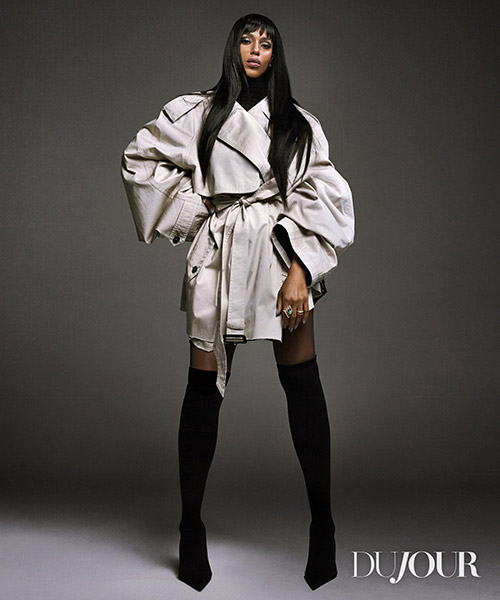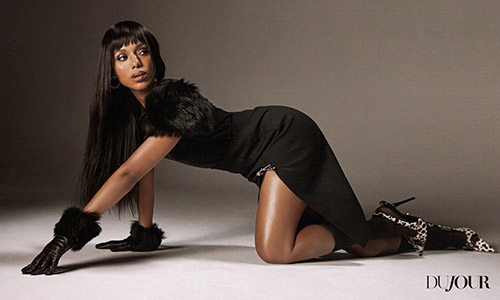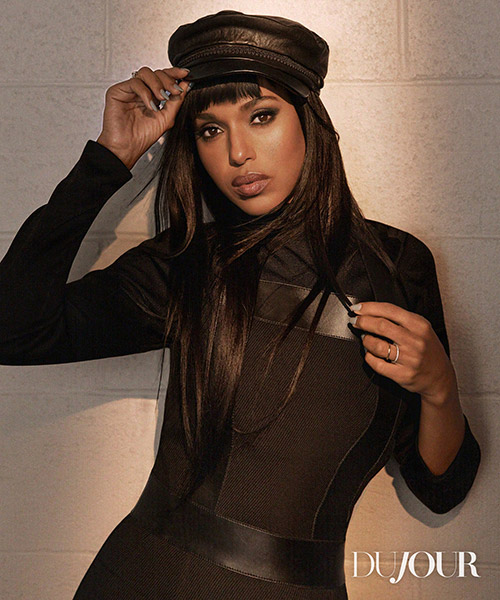Kerry Washington Soldiers On
by Natasha Wolff | December 16, 2024 11:04 am
Chances are that if all of us television obsessives had the chance to bring back one of the long-gone characters in the Shonda Rhimes universe, McDreamy and McSteamy among them, we’d probably choose Olivia Pope. She’s the political fixer at the heart of the long-running series Scandal, played iconically for seven seasons by the actress Kerry Washington. In an interview last year, even Rhimes herself said she yearned for Pope’s return.
“I like that character so much, even when she was bad,” Rhimes said.
But Washington doesn’t necessarily feel the same way.

“Not really,” Washington says, laughing, when asked if she misses—and misses playing—Olivia Pope. “I mean, I love her. She’s a pop culture icon. But I also love having the opportunity to play other characters. I’ve always imagined myself more of a character actor.”
One of Washington’s latest characters is Captain Charity Adams in the film The Six Triple Eight[1]. If Adams doesn’t end up being as indelible as Pope on Washington’s long resume, including playing Kay Amin in 2006’s The Last King of Scotland, Della Bea Robinson in 2004’s Ray and Anita Hill in the 2016 HBO movie Confirmation, she should be.
Adams, who died at 83 in 2002, was the first Black woman to be an officer in the Women’s Army Auxiliary Corps. She was the commanding officer of the 688th Central Postal Directory Battalion, made up of Black women serving during World War II.
The film, directed by Tyler Perry and released by Netflix in December, chronicles the journey of the 855 women as they sort more than 17 million pieces of undelivered mail that has left families and soldiers bereft from lack of contact with their loved ones. While their mission may sound minor on paper, on screen it is cinematic and epic. The women fight endemic and systemic racism. Their ability to fulfill a mission set up for failure ends up being an enormous feat of morale and patriotism. Perry, perhaps best known for his over-the-top comic characters like Madea, approaches the subject with subtlety and restraint. He—and Washington—may very well have a sleeper of an awards season contender on their hands.
Washington actually came upon the subject while she was filming social media content for Black Herstory Month. She honored many important Black women in history, including Rosa Parks and Pam Grier. Washington’s director of social media suggested that Washington pay attention to the Six Triple Eight, who had been awarded the Congressional Gold Medal in March 2021 for their service.
“I just thought their story was so magical,” Washington recalls. “I’d never seen myself in these WWII movies before.”
It so happened that Perry was circling a project about the battalion, too. An email from Perry and producer Nicole Avant, who is married to Netflix CEO Ted Sarandos, was waiting in Washington’s inbox to gauge her interest in playing Charity Adams.
“It was like, Holy crap, I had just learned about these women,” says Washington, who had worked with Perry over a decade earlier on the film For Colored Girls.
“I knew in an instant that she should play Major Charity Adams,” says Avant. “I can’t see anyone else playing this role better.”
Adds Perry: “When you’re telling stories about Black women, you need to lean into the experience of Black women who understood a version of what the ladies of the 6888 went through. Kerry has such a presence, and she is so loud. I knew she would know how to command an army.”

Washington is an anchoring presence in the film, but The Six Triple Eight is really an ensemble piece. It’s filled to the brim with young, talented Black actresses, including Ebony Obsidian, Shanice Shantay and Sarah Jeffery, the last of whom most impressed Washington’s kids—10-year-old Isabelle, 8-year-old Caleb and 19-year-old stepdaughter Anaiya—with former football player husband Nnamdi Asomugha.
“We’re huge Descendents fans in our household,” Washington says of Jeffery, who plays Princess Audrey, daughter of Princess Aurora, in the Disney Channel franchise and sings a song called “Queen of Mean.” “They said, ‘You’re doing a movie with the ‘Queen of Mean?’ That’s so fun!”
(Washington’s kids were also impressed by her Southern accent for The Six Triple Eight. “Why do you sound so different?” they asked when Washington showed them the film’s trailer. “It was the biggest compliment for me.”)
Perry says that observing Washington with her co-stars “was really inspirational. She has a grace and elegance that is always present, and I saw the others be in awe of her. She was so welcoming and made sure they were comfortable.”
“I have a much more low-key, casual nurturing vibe than Captain Adams, but it felt like a real honor to help them bring this to life,” says Washington, who also came on as a producer. Working with so many relative newcomers reminded her of starting out “when I was doing Ray and The Last King of Scotland, those early moments in your career and how exciting it is to be a part of something like this.”
When a thunderstorm struck the Six Triple Eight set in the U.K., the production shut for a few hours to get the generators going. This gave Washington and her castmates some unexpected down time. Washington pulled in the choreographer Debbie Allen, who helped stage the film’s dance and marching scenes, and got all her co-stars into a circle.
“I said to everyone, ‘This is your moment. Let’s jump in and see what questions everyone has,’” Washington recalls. “And we just talked about life and love and careers and dating and marriage and making smart choices and leadership and vulnerability. It was one of the most special hours I’ve spent on a set ever.”
(The information pathway went both ways during filming. What did Washington learn from her younger castmates? “Lots of TikTok dances,” she says.)

Washington remembers that she tried to convey to her younger colleagues that, when it comes to success, “half of it is luck and the other half is faith and being willing to say yes or no. It’s a little bit like being willing to follow your instinct and being prepared for when luck reveals itself.”
Washington says that writing her memoir Thicker Than Water[2], released last fall, was particularly instrumental in helping her find a new path. The Six Triple Eight was the first project she tackled after completing the book. Because she’d poured her soul out on the page, “there was a level of self-awareness and inner clarity that I was able to bring to Charity,” Washington says. “She had a real lack of emotional baggage or shame, a real quality of strength, a level of presence and comfort with herself as a leader.”
Telling her own story, for instance, that the man who raised her was not her biological father, that she was conceived from donated sperm, helped her step into that power. “It was an opportunity to step into the idea of myself as the lead character of my life,” Washington says. “Knowingly or unknowingly, I always was a supporting character in my parents’ story.
“I’ve always been so private, and I think I was afraid that writing the memoir would make me less interesting as an actor,” she adds. “But my own willingness to be this vulnerable has given me even more courage in my work. I think I have more peace. I think I’ve begun to embrace what it means to be a leader and to walk into spaces that scare me.”
Because of the family secrets, Washington says her “inner compass” was “fractured for a really long time. I always knew that something was up in our home, but I was always told there was nothing to look at. So I learned not to follow my instincts.”
But lately, at least since the catharsis of the book, she’s learning to trust herself more. To let go a little bit. To not grasp so tightly. “I suddenly felt so free,” Washington says. “It’s been a pathway back to my intuition and my connection with myself. I’m trying to be more and more directed by my inner compass as opposed to things that outwardly define success.”
She never expected, for instance, that she’d be producing (under her banner Simpson Street) multiple television shows like Unprisoned and Reasonable Doubt, even directing several episodes. Making documentaries like Daughters, in which four young girls prepare for a dance with their incarcerated fathers. Working in theater, which Washington hopes to return to very soon. “I’d like to get back on stage,” she says, adding that she’s currently mulling over a revival of a play.
Multitasking has always been important to Washington, even if it’s not at the level of Perry. “I think I have to just not hang out with him to see that I’m doing more,” Washington laughs. “But the people I’ve looked up to are multihyphenates: Rita Moreno and Jane Fonda[3] and Cicely Tyson. They directed and wrote and acted. They’re civically minded. They had families. I don’t think I ever expected I’d be doing this many kinds of things, but I really am happy doing all the things I’m doing. I always want to make sure there’s some kind of intentionality.”
Washington says she’s always believed that a door doesn’t close without another one opening, but, in the past, she’s often wondered if she’s moved through the doors too quickly.
“I’m often forcing the next door open. I don’t let myself sit in the hallway,” she says. “I want to give myself a little more time in the hallway. I want to allow myself to be in a fluid and creative open space so I can really discover what’s next.”
Hair: Takisha Sturdivant
Makeup: Carola Gonzalez
Manicure: Sreynin Peng using Dior Le Baume
Production: Arzu Koçman by Productionising
Shot at AGP West Studio in Los Angeles
- The Six Triple Eight: https://www.netflix.com/title/81590591
- Thicker Than Water: https://www.amazon.com/Thicker-than-Water-Kerry-Washington/dp/0316497398
- Jane Fonda: https://dujour.com/news/jane-fonda-interview-pictures/
Source URL: https://dujour.com/news/kerry-washington-the-six-triple-eight/